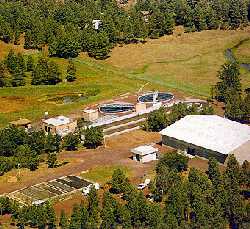A Created Wetland in Northeastern Arizona
Operation and Monitoring
The effluent produced by the Pinetop-Lakeside Sanitary
District's treatment plant has the following characteristics: |
|
Range |
Mo. Avg. |
Biological
Oxygen
Demand |
2-3 mg/l
|
2.4 mg/l
|
Total
Suspended
Solids
Turbidity |
1-13 mg/l
2.1-5.4 ntu |
6.4 mg/l
3.6 ntu |
|
 |
The treated wastewater is provided to a combination of the 7
ponds each year in accordance with the habitat management plan. Waterfowl
habitat needs and plant requirements are the primary factors affecting
management of the ponds and marsh.
|
Total N
(mg/l) |
Total P
(mg/l) |
Effluent
Pond 1
Pond 2 |
20.35
6.23
5.35 |
7.90
4.10
4.75 |
As water proceeds from one pond to another in the marsh, nitrogen
and phosphorus are removed from the water. These nutrients are taken up by
plants and animals and contribute to the overall productivity of the marsh. The
following (table) summarizes the removal rates for nitrogen and
phosphorus for the months of February, March, April and May 1991:
In addition to monitoring surface water quality, the
Pinetop-Lakeside Sanitary District samples 3 shallow wells on a quarterly basis
to insure groundwater quality is not being impacted.
For more information, please feel free to contact
the USDA Forest Service, Lakeside Ranger District at 928.368.5111 or you may
write us at 2022 W. White Mtn. Blvd., Pinetop-Lakeside, Arizona 85935
White Mountains Online wishes to express our
appreciation to the USDA Forest Service, Lakeside District for providing this
information! This and other articles may be found in print media entitled:
Constructed Wetlands for Wastewater Treatment
and Wildlife Habitat
United States Environmental Protection Agency
#EPA832-R-93-005
September 1993
|

